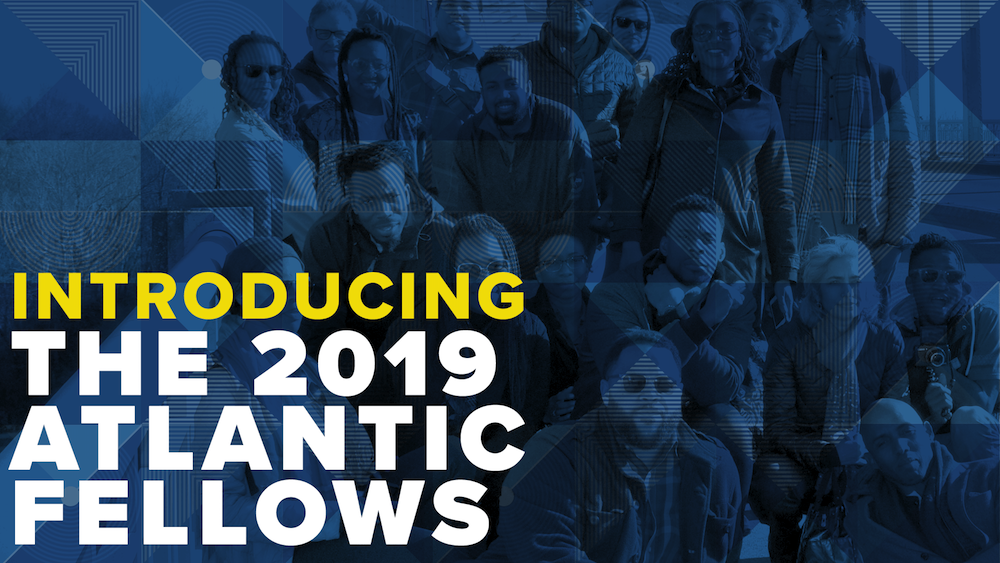Artists, Advocates and Organizers Challenge Anti-Black Racism
Selected from across the United States and South Africa, the 2019 Atlantic Fellows will join a transnational network of leaders working to challenge anti-black racism and build the policies, institutions and narratives needed for a more equitable future.

The Atlantic Fellows for Racial Equity (AFRE) today announced its second cohort of Atlantic Fellows — 20 leaders from across South Africa and the United States who are working to end anti-black racism in the two countries and to build a more equitable world. In New York City, the Fellows will work closely with faculty from Columbia University and will participate in a symposium about the 400th anniversary of the first Africans to be sold into slavery in Jamestown. In South Africa, they will conduct their work with the Nelson Mandela Foundation to engage in a series of dialogues around the history of Nelson Mandela’s leadership.
"The Atlantic Fellows Program for Racial Equity at Columbia University is a unique and important initiative that seeks to address and remedy two major concerns of our time — anti-black racism and structural inequality," said Farah Jasmine Griffin, the William B. Ransford Professor of English and Comparative Literature and African-American Studies at Columbia University. "The extraordinary group of activists and leaders bring a wealth of experience and thought to our campus, which is certain to benefit from their presence and interaction with our students and faculty. Columbia offers an especially rich environment for what is sure to be a mutually beneficial set of interactions."
As part of the program, the Fellows will receive financial resources and embark on a leadership journey in which they will meet, share, learn from and collaborate with other changemakers from around the world to advance strategies that achieve liberation for black people.
The 2019 Atlantic Fellows for Racial Equity are:
- Cedric Brown, Kapor Center
- Jitu Brown, Journey for Justice Alliance
- Zakiya Carr Johnson, Odara Solutions
- Busisiwe Dlamini, Centre for Diversity Studies, University of the Witwatersrand
- Betsy Hodges, former mayor of Minneapolis
- Regina Holloway, Policing Project at New York University School of Law
- Bongiwe Lenga, Creative Academy
- Mitchell Little, mayor’s office of the City of Philadelphia
- Dorah Marema, GenderCC Southern Africa-Women for Climate Justice
- Lucky Nhlanhla Mnisi, a marine ecologist
- Koketso Moeti, Amandla.mobi
- Constance Mogale, Rural Democracy Trust
- Elana Needle, Racial Equity Anchor Collaborative
- Wilneida Negron, Ford Foundation
- Lovelyn Nwadeyi, L&N Advisors
- Tess Nolizwe Peacock, lawyer and early childhood development advocate
- Kelvin Sauls, a community organizer
- Devon Simmons, Incarceration Nations Network
- Dylan Valley, documentary filmmaker and educator
- Deloris Wilson, BEACON: The D.C. Women Founders Initiative
Learn more about the 2019 Atlantic Fellows for Racial Equity
“Anti-black racism continues to undermine the possibilities for a more just, equitable and compassionate world,” said Kavitha Mediratta, PhD, executive director of the Atlantic Fellows for Racial Equity. “It’s critical that we support the professional and personal development of the leaders driving systemic change and provide a space where they can foster collaborations to make a real and lasting impact. Across South Africa and the United States, racial equity leaders are leveraging their scholarship, art and activism to dismantle anti-black racism, and we are proud to have 20 of the most impactful leaders as part of our program this year.”
Launched in 2017, AFRE’s yearlong, nonresidential fellowships at Columbia University in New York City and the Nelson Mandela Foundation in South Africa build knowledge, skills and a sense of community among Fellows working to address the causes of racial inequality. AFRE is one of seven interconnected Atlantic Fellows programmes which together create a global community to advance fairer, healthier and more inclusive societies. Its work is also informed by the history of Atlantic Philanthropies’ funding in South Africa and the United States and its deep commitment to advancing equity in these countries. As participants in a program housed at Columbia University and the Nelson Mandela Foundation, Fellows engage with faculty around innovative projects and study lessons from the history of Nelson Mandela’s leadership.
“South Africa and the United States have been shaped by anti-black racism and are still defined by racialized exploitation and other forms of violence,” said Sello Hatang, chief executive at the Nelson Mandela Foundation. “The transnational exploration of the history and current struggles for racial equity in these two places can inform leaders from both nations while also inspiring new forms of activism, scholarship and art that speak truth to power.”
As Atlantic Fellows for Racial Equity, leaders participate in transnational groups that build community and learn through structured dialogues, site visits and leadership trainings; guided webinar discussions that delve deeper into the topics that relate to the Fellows’ work; and partner with institutes that provide Fellows with foundational content in an academic setting. Fellows also receive individualized coaching and advice from professionals in their particular areas of focus or in their personal development. Fellows receive financial resources through a scholarship of $10,000 and additional project support of up to $10,000.
“In a changing world, the most impactful leaders are those who are able to build solidarity that draws traction from and leverages the communities to which they belong,” said Maxine Griffith, chair of AFRE’s board of directors and senior advisor to Columbia University President Lee C. Bollinger. “Through leadership development, community building and narrative shifting, AFRE supports racial equity leaders in building knowledge, skills and relationships to work effectively across identities, sectors and ideological perspectives so that more powerful and visionary change can be achieved.”
In January, AFRE graduated its inaugural cohort of Fellows and launched the Senior Fellows program. The Senior Fellows network furthers the impact of the fellowship experience by creating a community in which Fellows continue to develop their own leadership practices and engage in exchange, learning and experimentation with others.